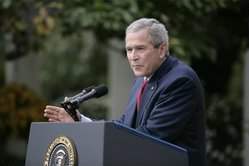


Gone, But Not Forgotten? What The Internet Will Look Like Under SOPA Fearsgiving Week Jesus Approves of Waterboarding Beware of Asteroids 


All links are current as of the date of publication. All content created by the author is copyrighted 2005-2010, except where held by the owners/publishers of parent works and/or subject materials. Any infringement of another's work is wholly unintentional. If you see something here that is yours, a polite request for removal or credit will be honored. |
� |
Questions for the PrezTuesday, Oct. 04, 2005 5:54 PM Excerpts from President Bush's news conference Tuesday morning at the White House. Excerpts from President Bush's news conference Tuesday morning at the White House.(Photo: Eric Draper, The White House.) Mr. Bush: We've been through a lot, but there's no question in my mind that we're going to accomplish great things. We'll make this country more secure; we'll help the parts of our country that got destroyed rebuild; we'll keep this economy strong. The work of our government goes on, and I'm looking forward to working with members of Congress to meet our obligations and responsibilities. Mr. President, exactly when were you planning on getting around to making the country more secure? Wasn't that the stated goal after 9/11, when the Department of Homeland Security was established? What have we been doing for four years? Hurricane Katrina showed that we, as a country, are poorly prepared for a natural disaster, let alone (God forbid) a second terrorist attack such as 9/11. Success in Iraq also requires that we not neglect our defenses at home. It's all well and good to go hunting the Big Bad Wolf, but a straw house is a straw house. Mr. Bush: You know, look, as I said the other day, to the extent that the federal government fell down on the job, I take responsibility. And I command a large, vast administration, and people I put in place, I take responsibility for the decisions they made. One area where I hope the country takes a look at is the responsibility between federal, state and local government when it comes to catastrophic events, highly-catastrophic events. In other words, is there a need to move federal assets more quickly, in spite of laws on the books that may discourage that. That's an area where I think we ought to take a good, hard look. Perhaps we should consider changing the response mode from passive to active. That is, if a natural disaster gives us the benefit of advance warning, key resources are mobilized automatically. Think of it as an alarm system with a motion detector. When the detector is tripped, it doesn't chime and wait for a security guard to hit the alarm ... it goes off automatically, because the relationship is established, tested, and reliable. We need to determine what should be mobilized as standard operating procedure, and what kind of resources can be safely held back without jeopardizing lives and resources. Mr. Bush: We have taken a look at FEMA. We've made decisions inside of FEMA. We're continuing to take a look at FEMA, to make sure FEMA is capable of dealing with an emergency of this size. And so there's a lot of analysis going on, not only to the response in the immediacy of the hurricane, but continuing to analyze, to make sure our response is a wise response. Mr. President, the budget cuts affecting FEMA were authorized by your signature. Messrs. Alpaugh, Brown, and Chertoff were appointed by you. If FEMA became incapable of dealing with an emergency of this size, it happened on your watch, and with your permission. The vulnerabilities of the flood control/levee system are not something that was just discovered. What, exactly, do you need to analyze? Mr. Bush: But I was disappointed, frankly, in the vote I got in the African American community. I was. I've done my best to elevate people to positions of authority and responsibility -- not just positions, but positions where they can actually make a difference in the lives of people. I put people in my Cabinet; I put people in my sub-Cabinet. I've elevated people from all walks of life, because I believe there's a responsibility for the President to reach out. And so it's not a matter of tone, it's also a matter of action. Somehow, I don't think your popularity in the African-American community is going to be increasing any time soon. Given that the Civil Rights Act wasn't that long ago, families still have vivid memories of segregation and discrimination. The media example of blacks labelled as 'looting' vs. whites labelled as 'finding food' shows we've still a long way to go. And, I hate to tell you, George, you can't run for a third term, so don't worry about whether or not the African-American community is going to vote for you or not. Mr. Bush: So another way to deal with it is to recognize we've got tight energy supplies. And one way to deal with tight energy supplies is to increase supply. And the only way to increase supply is to build refineries. Again, I repeat to you this amazing fact: We have not built a new refinery in America since the 1970s. And then we had the storm, and it took refinery capacity off, and guess what happens? It creates a tight supply situation, which causes price to go up. So Congress needs to deal with that. And I repeat, they need to get the Patriot Act to my desk. What does USA-PATRIOT have to do with this? USA-PATRIOT is already law; the USA-PATRIOT and Terrorism Prevention Reauthorization Act is still before the House and Senate, but I see nothing that addresses the nation's energy situation. Anybody? Bueller?
|